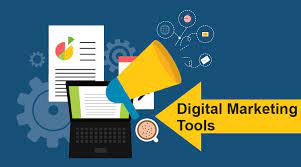Introduction
In today’s digitally-driven era, the landscape of marketing has transformed immensely, with a multitude of online channels offering vast opportunities for businesses. At the heart of this evolution lie indispensable tools that shape and amplify marketing efforts. From content creation to audience engagement and data analysis, these tools form the backbone of successful digital campaigns. Harnessing their potential empowers marketers to navigate the complexities of the online realm, connecting with audiences, optimizing strategies, and driving tangible results. Understanding and leveraging these tools effectively is not just advantageous but imperative in navigating the competitive and dynamic world of Digital Marketing.
Tools Used For Digital Marketing
Digital Marketing encompasses a wide array of tools and strategies aimed at promoting products, services, or brands through online channels. The Digital Marketing Courses Online help aspiring Digital Marketers to use different tools to achieve the desired results. In this fast-paced digital landscape, leveraging the right tools is crucial for successful campaigns.
Here are some important tools used in digital marketing.
1. Content Management Systems (CMS)
Tools like WordPress, Drupal, or Joomla facilitate content creation, publication, and management on websites. They allow easy editing, scheduling, and organization of content, which is fundamental for effective digital marketing.
2. Social Media Management Platforms
Tools like Hootsuite, Buffer, or Sprout Social help in scheduling posts, monitoring multiple social media accounts, analysing engagement metrics, and managing interactions across various platforms. They streamline social media marketing efforts.
3. Email Marketing Software
Platforms like Mailchimp, Constant Contact, or HubSpot enable businesses to create, automate, and analyse email marketing campaigns. They offer features such as list segmentation, A/B testing, and performance tracking.
4. Search Engine Optimization (SEO) Tools
Tools like SEMrush, Moz, or Ahrefs assist in optimizing websites to rank higher in search engine results. They provide insights into keywords, backlink analysis, site audits, and competitor analysis.
5. Pay-Per-Click (PPC) Advertising Tools
Google Ads, Bing Ads, or Facebook Ads Manager help create and manage paid advertising campaigns. These platforms offer targeting options, budget control, and performance tracking for effective ad campaigns.
6. Analytics Tools
Google Analytics, Adobe Analytics, or Mixpanel provide valuable insights into website traffic, user behaviour, conversion rates, and campaign performance. They help in making data-driven decisions to improve marketing strategies.
7. Customer Relationship Management (CRM) Software
Tools like Salesforce, HubSpot CRM, or Zoho CRM assist in managing customer interactions, tracking leads, and nurturing relationships. They help in personalized marketing and customer retention.
8. Marketing Automation Platforms
Tools such as Marketo, Eloqua, or Pardot automate repetitive marketing tasks like email campaigns, lead nurturing, and social media posting. They streamline workflows and improve efficiency.
9. Content Creation Tools
Canva, Adobe Creative Cloud, or Piktochart aid in creating visually appealing content, graphics, and infographics for Digital Marketing campaigns. They offer templates, design elements, and editing features.
10. Video Marketing Tools
Platforms like YouTube, Vimeo, or Wistia are essential for video content marketing. They offer hosting, analytics, and engagement metrics to optimize video campaigns.
11. Chatbots and Live Chat Tools
LiveChat, Intercom, or Drift help in providing real-time customer support and engagement on websites. They enhance user experience and assist in lead generation.
12. Heatmap and User Behaviour Tools
Tools like Crazy Egg or Hotjar track user behaviour through heatmaps, session recordings, and user surveys. They provide insights into how users interact with websites.
13. Project Management and Collaboration Tools
Tools like Trello, Asana, or Slack facilitate teamwork, task management, and communication among marketing teams. They ensure seamless collaboration and project organization.
Conclusion
In the vast realm of Digital Marketing, employing a diverse suite of tools is pivotal for success. These tools empower marketers to create, analyse, and optimize campaigns across various online channels. From content management systems and SEO tools to social media management platforms and analytics, each tool plays a crucial role in enhancing visibility, engaging audiences, and driving conversions. One can join the Digital Marketing Course in Gurgaon to learn more about the tools used for effective Digital Marketing. By leveraging these tools judiciously and staying abreast of industry innovations, businesses can craft robust strategies, make informed decisions, and navigate the ever-evolving landscape of Digital Marketing with confidence, ultimately achieving their objectives and fostering lasting connections with their audience.
Hello guys I’m Ashu, a Digital Marketer, My biggest aim is to achieve good results for the company.

